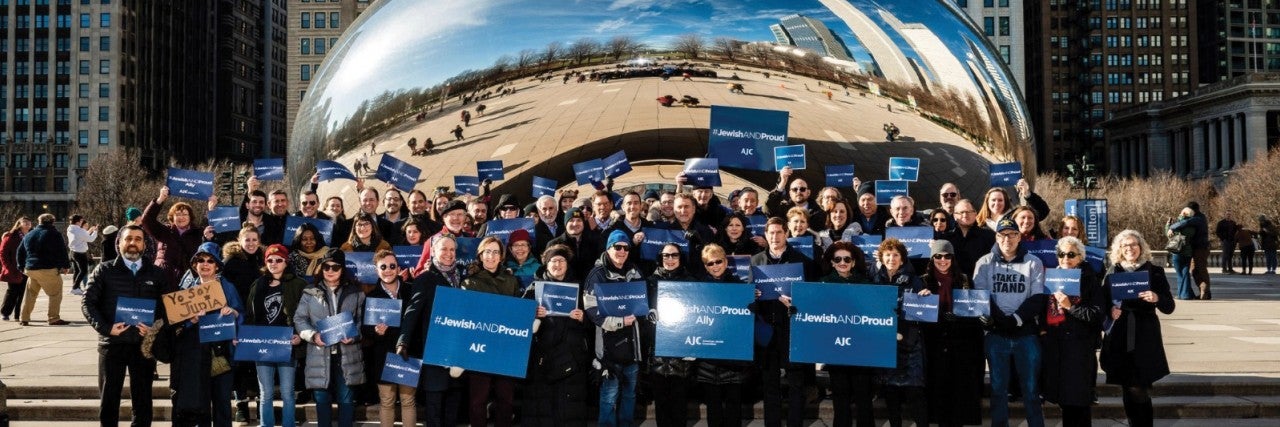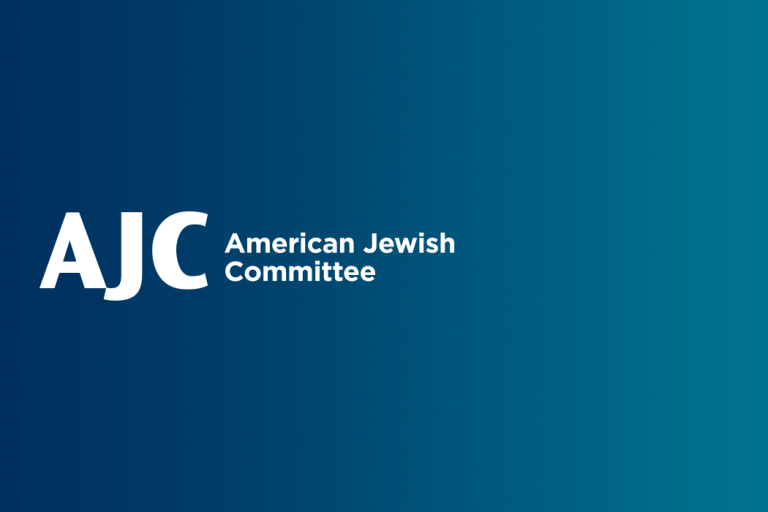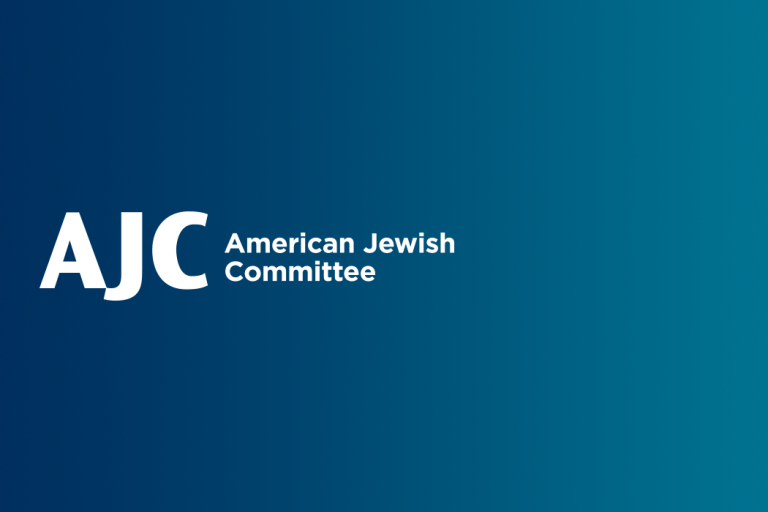December 30, 2020
With a global pandemic, racial justice protests, a surge of antisemitism and more, 2020 has been an especially trying year for us all. At the same time, the world has also witnessed countless points of light, from unprecedented efforts to help those most impacted by the pandemic and important developments in burgeoning Muslim-Jewish ties to historic peace achieved in the Middle East and North Africa. Here are 10 pivotal Jewish moments of 2020.
1. United Against Antisemitism
After four people were murdered in two shocking antisemitic attacks in New Jersey and New York in December 2019, AJC designated Monday, January 6, #JewishandProud Day to publicly and proudly declare Jewish pride and inspire solidarity within and with the worldwide Jewish community. Thousands of people from more than 60 countries shared what being Jewish means to them and how they planned to put their Judaism on display. Leaders from around the world, including Israeli Prime Minister Benjamin Netanyahu, actor Josh Malina, and the President of Brazil lent their support to the campaign, as did 40 members of Congress. The initiative, which was covered by more than 60 media outlets, launched the day after the “No Hate. No Fear.” solidarity rally against antisemitism in New York City, where 25,000 people gathered to stand up to antisemitism. AJC co-organized the solidarity march and rally.
“Antisemitism is not a Jewish problem for Jews to solve. Antisemitism is a non-Jewish problem for non-Jews to solve,” said AJC CEO David Harris in his address at the rally. Click here to watch his remarks.
2. Muslim-Jewish Historic Joint Visit to Auschwitz
Following the historic memorandum signed in April 2019 by His Excellency Dr. Mohammad bin Abdulkarim Al-Issa, Secretary General of the Muslim World League, and AJC CEO David Harris to further Muslim-Jewish understanding, a delegation from the Muslim World League (MWL) and AJC led a groundbreaking joint visit of Muslims and Jews to Auschwitz in January 2020. 62 Muslims from 28 countries, including 25 prominent religious leaders, participated in the mission, which was the most senior Islamic leadership delegation to ever visit Auschwitz or any Nazi death camp.
3. Adapting to a New World During a Global Pandemic
The COVID-19 virus has kept people mostly confined to their homes this year, redefining people’s relationships to the outside world and one another. Amid the chaos and uncertainty of this global crisis, AJC launched a pioneering online platform Advocacy Anywhere, which offers curated global Jewish advocacy webinars featuring high-profile leaders from around the world and AJC experts. To date, Advocacy Anywhere programs have been watched nearly 5 million times on Zoom, Facebook, YouTube, and other platforms. Top Advocacy Anywhere programs have featured former Secretary of State Madeleine Albright, Argentinian President Alberto Fernández, Colombian President Iván Duque Márquez, Uruguayan President Luis Lacalle Pou, Senators Ted Cruz (R-TX) and Chris Coons (D-DE), Archbishop of New York Cardinal Timothy Dolan, and AJC CEO David Harris, whose programs have included “From the Soviet Jewry Movement (Part 1 and Part 2),” “An Improbable Jewish Journey,” “The Frontlines of Pro-Israel Advocacy,” “The Six-Day War,” “Israel-Diaspora Relations,” and “The Resurgence of Antisemitism.”
4. Declaring Hezbollah a Terrorist Organization
In a dramatic move on April 30, the German government carried out police raids against organizations and individuals associated with Hezbollah and announced a full ban on the terrorist group’s activities on German soil, a decision for which AJC had long advocated.
2020 was a watershed year in AJC’s tireless campaign to urge all nations to designate the Iranian-backed organization a terrorist group in its entirety. In July, an AJC project made up of cross-party members of parliaments from Europe, the United States, Canada, and Israel, called the Transatlantic Friends of Israel (TFI), sent their Transatlantic Declaration to EU Commission President Ursula von der Leyen, EU High Representative for Foreign Affairs and Security Policy Josep Borrell, European Council President Charles Michel, European Parliament President David Sassoli, and the governments of all EU member states, urging them to ban Hezbollah in its entirety. In addition to Germany, Slovenia, Lithuania, Estonia, Latvia, Kosovo, Colombia, Honduras, Guatemala, and Serbia recognized all of Hezbollah as a terrorist organization this year, joining Argentina, Canada, Israel, Paraguay, the United Kingdom, the Netherlands, and the United States, as well as the Arab League and Gulf Cooperation Council.
5. Commitment to Racial Justice
Amid the national turmoil surrounding racial justice after the killings of George Floyd and Breonna Taylor in Minneapolis-St. Paul, Minnesota and Louisville, Kentucky, AJC announced the opening of new regional offices in those cities and reasserted its longstanding commitment to the struggle for equality, pluralism, and social harmony.
“We have more than a century of experience in our unswerving commitment to the civil rights struggle,” said AJC CEO David Harris. “AJC will bring that dedication and experience to the Twin Cities and Louisville. We want to contribute to the solution on the ground and do so in close partnership with like-minded institutions and individuals.”
In addition, AJC worked with the bipartisan Congressional Caucus on Black-Jewish Relations, which was launched at AJC's 2019 Global Forum in Washington, D.C., to convene a roundtable with members of Congress and Black and Jewish organizations to discuss policy recommendations to combat racism in the U.S. AJC's Chief Policy and Political Affairs Officer Jason Isaacson and President Harriet Schliefer presented a six-point plan to address the pernicious legacy of racial inequality in our country.
6. Re-Strengthening Black-Jewish Ties
AJC joined forces with the National Urban League (NUL) to declare September 6-11 #BlackJewishUnity Week, reinforcing our joint struggle against antisemitism and racism. AJC and the NUL called on members of the Jewish and Black communities to foster #BlackJewishUnity, attend joint AJC-NUL programming, educate each other, and remember and honor the Black and Jewish leaders over the past century who forged this relationship.
Check out 10 Great Moments of #BlackJewishUnity, the 15 Things to Watch and Read on Black Experiences in America, and the 15 Things to Watch and Read on The American Jewish Experience.
The initiative took place after several prominent figures in the African American community, including entertainer Nick Cannon and a Philadelphia NAACP leader, came under fire for making antisemitic comments.
“I apologize specifically for the hurtful words, because that was never my intention,” said Cannon in his first appearance on a Jewish program, an AJC Advocacy Anywhere event in August. “If my goal truly is to break down the walls and barriers among communities and bring us closer together, it truly is time to get rid of the things that divide us.”
7. Normalization Between Israel and the Arab World
In 2020 relations between Israel and the Arab world reached new levels. This year brought the welcome news that the United Arab Emirates, Bahrain, Sudan, and Morocco would normalize ties with Israel. For decades, AJC has been quietly working to enhance cooperation between Arabs and Jews, regularly traveling to the region to create connections with political, civil, and religious leaders.
On September 15, the world watched as President Trump, Israeli Prime Minister Netanyahu, UAE Foreign Minister Abdullah bin Zayed bin Sultan Al Nahyan, and Bahrain Foreign Minister Dr. Abdullatif Al-Zayani signed the groundbreaking Abraham Accords. These accords laid the foundation for official diplomatic, economic, and people-to-people ties between Israel and the two Gulf states.
AJC enthusiastically applauded the Abraham Accords, and CEO David Harris and Chief Policy and Political Affairs Officer Jason Isaacson attended the signing ceremony at the White House. “History was made today thanks to the dedication of President Trump to advance Arab-Israeli peace, to Prime Minister Netanyahu’s vision, and to the wisdom and courage of UAE and Bahraini leaders to embrace Israel,” said Harris.
In October, history was made again when Sudan, a democratizing republic, announced its intention to normalize relations with Israel. Since 2006, AJC’s Africa Institute has played a prominent role in forging building bonds between Israeli and African leaders.
Finally, in December, Morocco, once home to the Arab world’s largest Jewish population, became the sixth state to announce that it was re-establishing relations with Israel. AJC delegations, led by Jason Isaacson, have been visiting Morocco regularly for decades. “Our engagement with the Kingdom of Morocco, and with our Jewish community and civil society partners there, is a key component of our ongoing outreach to the Arab world, with the aim of advancing mutual understanding and regional peace,” said Isaacson during a 2018 visit. In late December, a Memorandum of Understanding was signed between AJC ACCESS and the Mimouna Association, an organization of Moroccan Muslim leaders, to further ties with American, Israeli, and Arab young professionals.
8. The Passing of Supreme Court Justice Ruth Bader Ginsburg
On September 18, Supreme Court Justice Ruth Bader Ginsburg passed away from complications of metastatic cancer of the pancreas. Justice Ginsberg loomed large over the American legal landscape for more than half a century, as a women’s rights advocate, judge on the U.S. Court of Appeals for the District of Columbia (1980-1993), and justice on the Supreme Court (1993-2020).
A pioneering advocate for women’s rights and only the second woman to serve on the Supreme Court, Justice Ginsburg was proudly Jewish. She articulated her identity in her address to the 1995 AJC Annual Meeting and in an AJC newspaper ad series in The New York Times, What Being “Jewish Means To Me.”
“I am a judge born, raised, and proud of being a Jew. The demand for justice runs through the entirety of the Jewish tradition. I hope, in my years on the bench of the Supreme Court of the United States, I will have the strength and courage to remain constant in the service of that demand,” said Ginsburg in the ad, which appeared on January 14, 1996. Click here to listen to an AJC People of the Pod podcast interview with Ginsburg’s former clerk Abbe Gluck about the late Justice’s legacy.
9. Antisemitism Report Release
AJC released the first-ever State of Antisemitism in America report on October 26. Based on parallel surveys of American Jews and the U.S. general public, this comprehensive report shows deep anxiety among Jews and a disturbing lack of awareness among the general public about the severity of antisemitism in the United States. The divergence of views between the two groups is striking. While 88% of American Jews view antisemitism as a problem in America, a stunning 46% of all Americans said they don’t know what antisemitism means, including 21%—one in five—who said they had never heard the word before. At the same time, large majorities of both groups—85% of American Jews and 74% of the U.S. general public—view anti-Zionism as a form of antisemitism. Click here to view the results and major takeaways.
10. The 2020 U.S. Elections
AJC has a long history of engaging with presidential candidates and the political parties to ensure that our concerns and priorities are at the forefront of the minds of policymakers. For the first time, AJC featured virtual panels composed of world leaders, members of Congress, party officials, and AJC experts during the Democratic and Republican National Conventions. AJC also sought ongoing high-level engagement with the candidates and their advisors.
AJC has close and longstanding ties with both President-elect Biden and Vice President-elect Harris. As candidates in the Democratic presidential primary, both Joe Biden and Kamala Harris addressed the AJC Global Forum 2019 via video.
Over the last two months, Biden named two officials with longstanding ties to AJC to his cabinet: Antony Blinken, a longtime friend of AJC who addressed the AJC Global Forum in 2015 and 2020, is Secretary of State-designate; and Pete Buttigieg, who in 2018 traveled to Israel with AJC Project Interchange and discussed his experiences there on AJC’s People of the Pod podcast, is Transportation Secretary-designate.
In AJC's statement congratulating the President-elect, AJC CEO David Harris acknowledged the polarization and unrest within our country and called for it to be addressed immediately: “Reuniting the country, restoring lost faith in each other and in our common destiny, must be the first order of business for President Biden and his administration... The success of the 244-year-old American experiment is in our hands, and it is essential not only for our nation but for global peace, security, and opportunity.”
AJC looks forward to working with the incoming administration on the most pressing issues facing America – including the vital healing and rebuilding of trust in our democratic institutions – as well as the issues central to the state of Israel, the Jewish community, and the world.


